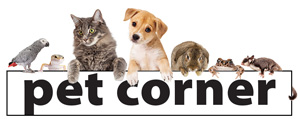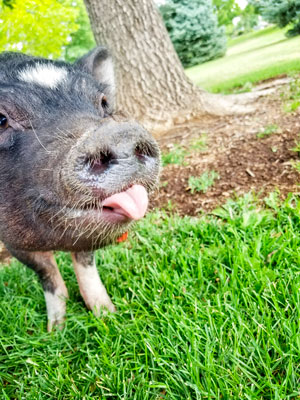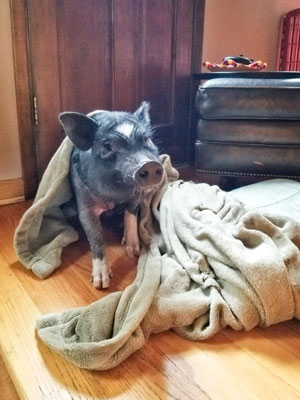Pigs in the Pines
By Kathy Fallert; photos courtesy of Jacqueline Landry


Jacqueline Landry is the owner of this adorable indoor potbellied pig named Zadie May Sassypants.

Zadie May Sassypants all cozy in blanket.
March 1 is National Pig Day, celebrating domesticated pigs with pig parties and pig parades. But how about a pig as a pet? Although some people would never consider sharing their home with a pig, potbellied pigs can be quite charming and affectionate characters.
A pig’s size will depend on the breed, but the average body for a pot-bellied pig is 16 to 30 inches tall and usually weighs between 90 to 150 pounds. A potbelly will live an average of 12 to 18 years.
Potbelly pigs are curious and playful, as well as sensitive and headstrong. They are clever and intelligent animals that can be trained and even taught to do tricks. They learn quickly. They don’t forget and they are able to deduce. Much like dogs, they can be house trained to either use the bathroom outdoors or in a litter box. They can also be leash trained. However, due to their high intelligence they can be a bit of a handful. They are easily bored and can become destructive if not provided with enough stimulation.
Pigs respond well to positive reinforcement such as praise and treats when their behavior is desirable. It can take a lot of repetition and patience when traveling the road to having a well-mannered pig. Pigs should be spayed or neutered to avoid raging hormones. Pigs can be territorial but are most content when they have their own personal space. Most importantly, pigs love to root – which is digging and searching with their snout. It is a natural instinct for them and helps regulate their body temperature on a hot day.
An indoor rooting box of rocks is beneficial to satisfy the need to root, and it’s a good place to put a treat or some of the pig’s chow. Also recommended is an outdoor area of dirt for rooting, as is scattering your pig’s food so he or she can search for it. Rooting in dirt is also a source of minerals such as iron for your pig. The adult pig diet should include pig pellets that are low in protein and fat as well as high in fiber. Fresh non-starchy vegetables should make up 25% of the pig’s daily diet. You can also provide alfalfa hay or bran for fiber.
For more information about owning a pet potbelly pig, visit www.petmd.com/exotic/care/guide-owning-potbellied-pig.